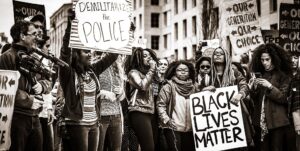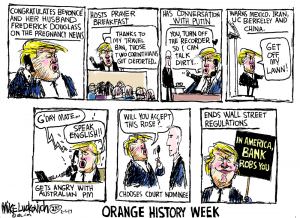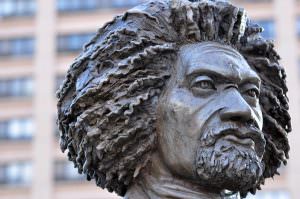America Can’t Wipe Itself Clean of Blackface
Virginia Gov. Ralph Northam offers a painful reminder that certain white people in this country just don’t get it, and likely never will. Virginia Gov. Ralph Northam admits he used blackface during his days in medical school. (VCU Capital News Service / Flickr)
Virginia Gov. Ralph Northam admits he used blackface during his days in medical school. (VCU Capital News Service / Flickr)
On March 14, 1968, The Rev. Martin Luther King gave a speech in South Grosse Pointe, Mich., in which he stated: “We will never solve the problem of racism until there is a recognition of the fact that racism still stands at the center of so much of our nation, and we must see racism for what it is. … It is the notion that one group has all the knowledge, all the insights, all of the purity, all of the work, all of the dignity. And another group is worthless, on a lower level of humanity, inferior.”
Blackface and the racism that gave birth to it refuse to go away, or stay hidden, even in a decades-old medical school yearbook.
Have you looked in your school yearbook or photo album from yesteryear lately? Are you wearing blackface? Have you ever worn blackface before? Do you know of anyone, family or not, who has put on blackface to entertain someone, including you? If so, did you laugh out loud when you saw anyone wearing it? How did it make you feel, besides amused?
I purposely did not write a column for Black History Month this year. That’s because it is, for the most part, for black people to celebrate all of the accomplishments and contributions we have made in this country, even though they were not acknowledged as such by white people. While we must confront, understand and build upon all of the negative treatment that has and is still happening to us as a people, Black History Month is to celebrate the fact that we are still here, despite our tortured past in this country.
We must tell our stories in our own way and hope that they will not be ignored or left out historically any longer. Yet no matter how much we progress and try to believe that the past is in the past, and that it’s a new day in this country, certain white people seem to always remind us that the past is still present in America.
Blackface, whether it’s shoe polish, paint, tar or any other substance, has its place in the tortured history of black people. In the beginning of the year, Gov. Ralph Northam of Virginia was exposed for having worn blackface in a photo in his 1980s medical school yearbook. At first, when confronted with the racist photo, he apologized for doing it. The next day. he changed his story and said that it wasn’t him in the photo, though he acknowledged having, at another time, put “a little shoe polish” on his face to look like entertainer Michael Jackson, who, by the way, was lightening his skin because he said he had a skin disease.
The Virginia attorney general came forward and said that he too did a blackface thing when he was in college in the 1980s because he wanted to look like the rapper Kurtis Blow. Former Fox journalist and NBC talk show host Megyn Kelly said on her morning show that it was OK for white people to wear blackface if it was part of a Halloween costume. An uproar followed and she lost her show and was terminated by NBC. Kelly is a Republican; the governor and attorney general of Virginia are Democrats. So this blackface thing crosses political party lines. But all of them are white.
I wonder: Who among this country’s so-called progressive figures and politicians will be the next to be found hiding a racist past in his or her yearbook, photo albums or family archives?
This type of racism happens in this country every day, in one form or another. This is not a Black History Month thing, this is an American Every Month thing.
As a poor black man on death row, I have a dictionary, one of the cheapest sold, because it was all I could afford. I call it my “poor man’s dictionary,” because of its price and the fact that I am poor, as is damn near everyone on death row.
When I need to find the definition of a word, I go to my poor man’s dictionary, as I did in writing this piece. I wanted to look up the word “blackface” to get its full meaning. I was disappointed, but not surprised, to see that the word was not listed in my dictionary.
There was “black,” “blackball,” “blackbeard,” “blackbelt,” “blackjack,” “blackbox” and on and on and on, but no “blackface.”
So I looked up the word “black” and then truly understood the omission of blackface. The word black means: 1) of the color black; also very dark; 2) swarthy; 3), of or relating to various groups of dark skinned people; 4) of or relating to the African-American people or their culture; 5) soiled, dirty; 6) lacking light; 7) wicked, evil; 8) dismal, gloomy; 9) sullen; 10) not conforming to a high moral standard; 11) morally unacceptable, bad; 11) opposite of white.
The people who wear blackface, who are saying it’s OK and laugh about it, are all saying with their actions what those definitions say in my dictionary. The real reason for wearing blackface is to put black people down while lifting white people up, to belittle black people while making white people feel bigger.
Blackface is not a fad or a phase; it’s a statement of how the person who wears it feels about black people. It’s not a compliment to a black person to see a white person wear or support blackface. It’s an insult.
Certain white people in this country just don’t get it, and never will. That’s because blackface to them is just another way to call black people the n-word.
Your support matters…Independent journalism is under threat and overshadowed by heavily funded mainstream media.
You can help level the playing field. Become a member.
Your tax-deductible contribution keeps us digging beneath the headlines to give you thought-provoking, investigative reporting and analysis that unearths what's really happening- without compromise.
Give today to support our courageous, independent journalists.






You need to be a supporter to comment.
There are currently no responses to this article.
Be the first to respond.